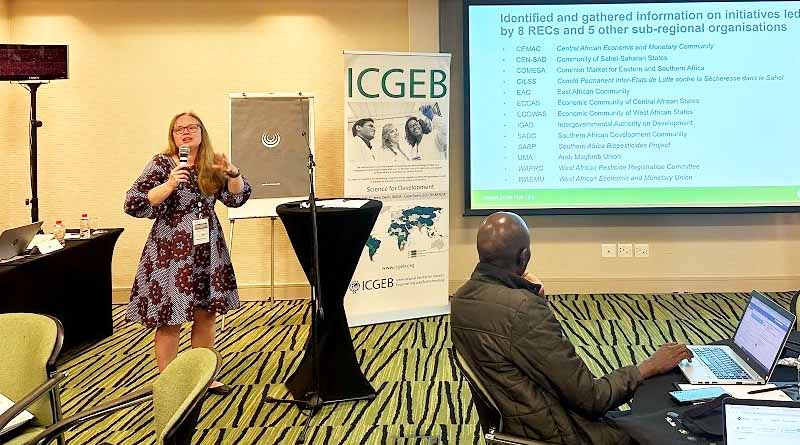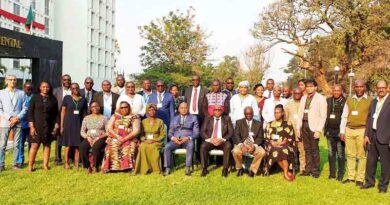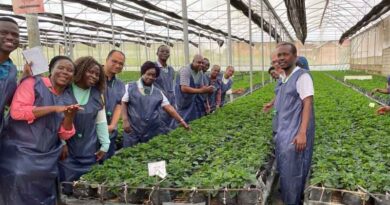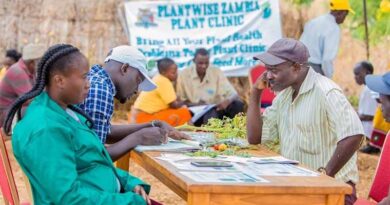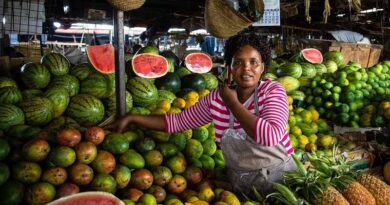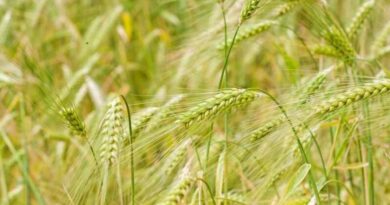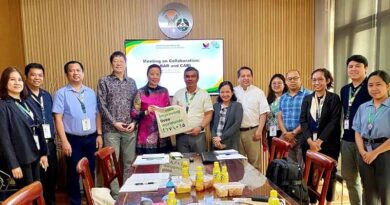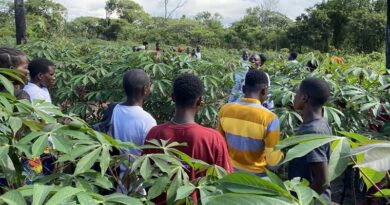Expertise in biological control highlighted at workshop aimed at catalysing biopesticide use in Africa
13 March 2024, Africa: CABI scientists have highlighted their expertise in biological control agents to sustainably fight crop pests and diseases at a workshop aimed at catalysing the development of the biopesticides industry and building regional harmonization to help ensure that farmers have access to biopesticides across Africa.
Dr Melanie Bateman, Dr MaryLucy Oronje, Dr Ivan Rwomushana, and Dr Robert Malek attended the workshop ‘Advancing Regulatory Harmonisation and Biopesticide Innovation in Africa,’ which was co-organised by the African Union- InterAfrican Phytosanitary Council, ICGEB, the USDA FAS, CropLife Middle East and Africa, the WTO STDF, the African Food Safety Initiative, the National Research Foundation and CABI.
The workshop brought together regulatory professionals, researchers, industry experts, and policymakers to discuss various aspects of regional and continental harmonisation of registration of guidelines for biopesticides in Africa.
Opportunities for alignment in guidelines and laws
Dr Bateman gave an overview of the Inter-African Phytosanitary Council (IAPSC)/CABI biopesticide study which explored areas of overlap, divergence, and opportunities for alignment in guidelines and laws governing registration of biopesticides in Africa.
“The harmonization of the procedures for the registration of biopesticides is high on the agenda and lessons can be learnt from those who already have guidelines in place” she said. “Consideration should also be given to what will be needed for domestication of guidelines at national level.”
Lower risk control approach recommended
In a presentation entitled ‘Can farmers produce their own biopesticides: a baculovirus for fall armyworm in Kenya and Zambia,’ Dr Rwomushana said a lower risk control approach to the pest is recommended with baculoviruses safe to use as they are not hazardous to beneficial insects, mammals, bees, or aquatic organisms.
CABI is developing and testing a model for novel, affordable and sustainable production of baculoviruses at the farm level to combat fall armyworm in Zambia and Kenya.
“The approach ensures that farmers have an effective and locally adaptable solution to manage their FAW problem and increases the longer term understanding of how biopesticides work and the increase in their use on the African continent,” he said.
The event also explored and shared stewardship practices that should be employed to achieve effectiveness in handling biopesticides, including safety guidelines and how such practices can be incorporated into Integrated Pest Management (IPM).
The workshop also featured a dedicated exhibition space, providing a platform for showcasing existing innovations, ongoing research and development efforts, and industry advancements including the CABI BioProtection Portal, which was showcased by Dr Malek.
Dr Malek gave a presentation on the CABI BioProtection Portal under a panel dedicated to “Biopesticide Innovation and Stewardship.”
He positioned the portal as a valuable tool, available in English and in local languages, online and offline, that can serve some of the purposes of enhancing availability, access, and use of bioprotection products in Africa.
He also highlighted the importance of working with the private and public sector representative in the African Union to strengthen the impact and reach of this tool.
The CABI BioProtection Portal stands as an innovative open access tool for sustainable pest management. It helps advisory service providers and growers identify and correctly apply biocontrol and biopesticide products and, as such, is particularly useful for increasing the uptake of lower-risk alternatives in Africa.
Latest research findings, regulatory experiences, and innovations
An innovative open access tool for sustainable IPM, the CABI BioProtection Portal helps advisory service providers and growers identify and correctly apply biocontrol and biopesticide products and, as such, is particularly useful for the cultivation of harder to produce minor crops including pulses and legumes.
Dr Malek said the ICGEB joined the Portal as a Sponsor in October 2022 and is helping to share the data they collect regarding the bioprotection products in Botswana, Mozambique, South Africa, Tanzania, Zambia, and Zimbabwe.
“One of the advantages of being part of the Portal, is that is helps farmers access niche markets for their produce, where reduce Maximum Residue Limits and integration of more sustainable agricultural practices are required,” he said.
Practical experiences from regional regulatory harmonisation programmes
Dr Oronje, meanwhile, was the Chair for a session looking at case studies of regulatory harmonisation of biopesticides. The session shared practical experiences from regional regulatory harmonisation programmes on the continent.
The session introduced a Good Regulatory Practice guide – developed by the Standards and Trade Development Facility (STDF) – which explained how the Southern Africa Biopesticides Project used it in the process of working with countries in the region to develop draft harmonised biopesticides registration guidelines.
Dr Oronje said, “A cohesive framework that facilitates the effective registration and use of biopesticide products is required that reflects the needs of each country within Africa where experiences with crop pests and diseases will be unique to them.
“Supporting and promoting innovation in the field – including the use of digital tools such as the CABI Bioprotection Portal and Horizon Scanning Tool – is also necessary to ensure a continuous pipeline of effective biopesticide solutions.”
The workshop was sponsored by CABI as well as the African Union- InterAfrican Phytosanitary Council (AU-IASC), Africa Food Safety Initiative (AFSI), CropLife Africa Middle East, the Food and Agriculture Organization of the United Nations (FAO), ICGEB, the National Research Foundation, the STDF the United States Department of Agriculture Foreign Agriculture Service (USDA FAS).
Dr Saliou Niassy, Coordinator, African Union Inter-African Phytosanitary Council (AU-IAPSC), said, “The area treated by biopesticides is increasing in Africa, the demand is increasing, therefore the need for harmonization is imminent and timely, as making products available is the first priority.”
Also Read: Coromandel’s Gromor Drive Crosses 16,000+ acres of Drone-led Spraying
(For Latest Agriculture News & Updates, follow Krishak Jagat on Google News)

